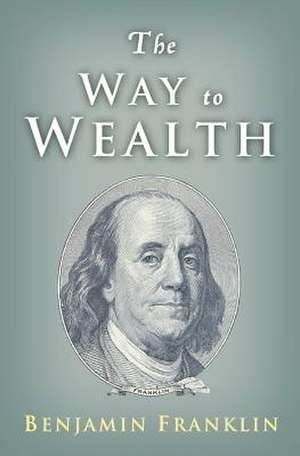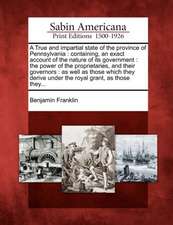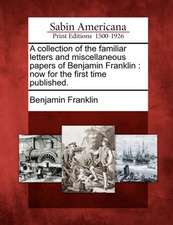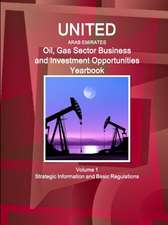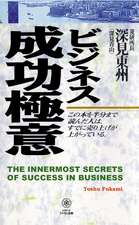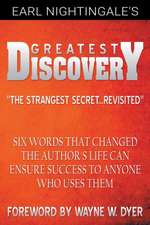The Way to Wealth
Autor Benjamin Franklin Editat de Charles Conraden Limba Engleză Paperback
| Toate formatele și edițiile | Preț | Express |
|---|---|---|
| Paperback (5) | 40.81 lei 3-5 săpt. | |
| www.bnpublishing.com – 10 sep 2007 | 40.81 lei 3-5 săpt. | |
| CreateSpace Independent Publishing Platform – | 56.40 lei 6-8 săpt. | |
| – | 62.98 lei 6-8 săpt. | |
| Stonewell Press – 18 oct 2013 | 63.76 lei 6-8 săpt. | |
| SOUND WISDOM – 16 aug 2022 | 76.77 lei 6-8 săpt. | |
| Hardback (1) | 65.56 lei 3-5 săpt. | |
| Applewood Books – 31 aug 1986 | 65.56 lei 3-5 săpt. |
Preț: 56.40 lei
Nou
Puncte Express: 85
Preț estimativ în valută:
10.79€ • 11.20$ • 8.100£
10.79€ • 11.20$ • 8.100£
Carte tipărită la comandă
Livrare economică 27 martie-10 aprilie
Preluare comenzi: 021 569.72.76
Specificații
ISBN-13: 9781442119215
ISBN-10: 1442119217
Pagini: 52
Dimensiuni: 133 x 203 x 3 mm
Greutate: 0.07 kg
Editura: CreateSpace Independent Publishing Platform
ISBN-10: 1442119217
Pagini: 52
Dimensiuni: 133 x 203 x 3 mm
Greutate: 0.07 kg
Editura: CreateSpace Independent Publishing Platform
Notă biografică
Benjamin Franklin (1706-1790) was one of America's most influential Founding Fathers. He was an author, printer, politician, postmaster, scientist, musician, inventor, statesman, and diplomat. Franklin invented the lightning rod, the Franklin stove, a carriage odometer, and bifocals. He served as President of Pennsylvania (which would be Governor today), United States Minister to France, United States Minister to Sweden, and United States Postmaster General. At 70, he was the oldest signer of the Declaration of Independence. He was a publisher; most famously of Poor Richard's Almanack, which was published from 1732 to 1757. Franklin biographer Walter Isaacson calls him "the most accomplished American of his age and the most influential in inventing the type of society America would become."
Recenzii
washingtonpost.com Pearls From Poor Richard By Michelle Singletary Sunday, January 4, 2004; Page F01 Since I suspected some of you would be recovering from a stress- and debt-filled holiday, I decided to make the Color of Money Book Club choice for January an oldie but a goodie penned by Benjamin Franklin. This month I'm recommending Franklin's "The Way to Wealth" (Applewood Books, $9.95). At just 30 pages, this pocket-size book takes less than a half-hour to read but will give you a lifetime of financial wisdom -- that is, if you're wise enough to follow the advice. "The Way to Wealth" is an essay first published in 1758 as a preface to Franklin's Poor Richard's Almanack. The essay begins with Franklin's fictitious Father Abraham being asked to talk about taxes by a crowd waiting for an auction to start. Father Abraham, who quotes Poor Richard, lectures the consumers on topics ranging from the perils of idleness to business ownership to frugality to the dangers of debt. Franklin's most well-known quotes can be found in this essay. Here are just a few: "Early to bed and early to rise makes a man healthy, wealthy and wise." "Never leave that till tomorrow, which you can do today." "God helps those who help themselves." It is in "The Way to Wealth" that you will find Franklin's most famous maxims about money. In fact, Arthur Levitt, former chairman of the Securities and Exchange Commission, gave out copies of "The Way to Wealth" at his final investor town-hall meeting. Here's what Franklin's Father Abraham said: On the importance of saving: "If you would be wealthy, think of saving, as well as of getting. Away, then, with your expensive follies, and you will not have then so much reason to complain of hard times." These words ring so true today. In fact, if current savings patterns continue, there will be an annual shortfall of at least $45 billion by 2030 between the amount retirees need to cover basic expenses and what they have accumulated, according to a new study by the Employee Benefit Research Institute in collaboration with the Milbank Memorial Fund, a New York research foundation. For many middle-income folk, the personal shortfall could be avoided if they saved just 5 percent of their annual income every year, the authors of the study concluded. On the foolishness of always searching for a sale "Many have been ruined by buying good pennyworths . . . and yet this folly is practiced every day at auctions." Think Wal-Mart or Target: Bargain shoppers get positively giddy when boasting how they saved money on various items (I know I used to). But if you buy one item and get the second at half off, you haven't saved any money. You're still spending. "You can go broke saving money," Jeff Lychwick, one of my readers, often says. On the constant need to buy clothes and goods: "What use is this pride of appearance, for which so much is suffered? It cannot promote health, nor ease pain: it makes no increase of merit in person, it creates envy, it hastens misfortune." Father Abraham then asks the crowd "what madness it must be to run in debt for these superfluities?" How often do we all (me included) succumb to the clever marketing of stuff we don't need? "The blurring of this needs/wants distinction helps fuel our consumer society," wrote Knight Kiplinger in the January issue of Kiplinger's Personal Finance magazine. "The success of this process over the past two decades has resulted in what I call the democratizing of luxury. Today as never before, American households at virtually every income level seek products whose price, quality and prestige clearly exceed the functional need to be met." Just look at how DVDs have become an electronic "necessity." For goodness' sake, people were pushing and shoving for a chance to buy a $29 DVD player at Wal-Mart during the holiday season. Madness! On the accumulation of debt: "Think what you do when you run into debt; you give to another power over your liberty." Franklin goes on to write: "When you have got your bargain, you may, perhaps, think a little of payment; but, as Poor Richard says, creditors have better memories than debtors. . . . The day comes round before you are aware, and the demand is made before you are able to satisfy it." "The Way to Wealth" should be required reading, especially for teens and young adults -- before they get credit cards. It's no wonder Franklin is on the $100 bill. His timeless insight on money management is worth a handsome sum. Michelle Singletary discusses personal finance Tuesdays on NPR's "Day to Day" program and online at www.npr.org . Readers can write to her in care of The Washington Post, 1150 15th St. NW, Washington, D.C. 20071 or by e-mail at singletarym@washpost.com . 2004 The Washington Post Company -- Michelle Singletary "Washington Post" (01/04/2004)
Extras
* "There are no gains, without pains" * "One today is worth two tomorrows" * "Time is money" * "A life of leisure and a life of laziness are two things" * "Get what you can, and what you get hold" * "Sloth, like rust, consumes faster than labor wears, while the used key is always bright" * "Have you somewhat to do tomorrow, do it today" * "The eye of a master will do more work than both his hands" * "Early to bed, and early to rise, makes a man healthy, wealthy and wise"
Descriere
Descriere de la o altă ediție sau format:
The first American book on personal finance, The Way to Wealth by Benjamin Franklin is still the best and wisest money book ever written. Originally published in 1758 as the preface to Poor Richard's Almanack, this little gem has been through innumerable printings and sold millions of copies to those in search of smart but entertaining advice about hard work, earning and saving money and debt.As the 21st Century charges along and the current economic climate continues to send out mixed messages, Franklin's simple but wise commentary on the value of industry and frugality resonates as much for us today as it did for listeners nearly 350 years ago. Here is a sample: • “Early to bed and early to rise makes a man healthy, wealthy and wise.”
• “If you would be wealthy, think of saving, as well as of getting.”
• “If you would have your business done, go; if not, send.”
• “Think what you do when you run into debt; you give to another power over your liberty.”
• “Creditors have better memories than debtors.”
Although older than the United States itself, The Way to Wealth is still very popular. It is handed out by major companies and financial institutions to friends, clients, and customers and is the January, 2004 selection of The Washington Post's the Color of Money Book Club. As Michelle Singletary, director of the Club wrote in a column about The book, “At just 30 pages, this pocketߝsize book takes less than an hour to read but will give you a lifetime of financial wisdom—that is if you're wise enough to follow the advice.”
The first American book on personal finance, The Way to Wealth by Benjamin Franklin is still the best and wisest money book ever written. Originally published in 1758 as the preface to Poor Richard's Almanack, this little gem has been through innumerable printings and sold millions of copies to those in search of smart but entertaining advice about hard work, earning and saving money and debt.As the 21st Century charges along and the current economic climate continues to send out mixed messages, Franklin's simple but wise commentary on the value of industry and frugality resonates as much for us today as it did for listeners nearly 350 years ago. Here is a sample: • “Early to bed and early to rise makes a man healthy, wealthy and wise.”
• “If you would be wealthy, think of saving, as well as of getting.”
• “If you would have your business done, go; if not, send.”
• “Think what you do when you run into debt; you give to another power over your liberty.”
• “Creditors have better memories than debtors.”
Although older than the United States itself, The Way to Wealth is still very popular. It is handed out by major companies and financial institutions to friends, clients, and customers and is the January, 2004 selection of The Washington Post's the Color of Money Book Club. As Michelle Singletary, director of the Club wrote in a column about The book, “At just 30 pages, this pocketߝsize book takes less than an hour to read but will give you a lifetime of financial wisdom—that is if you're wise enough to follow the advice.”
